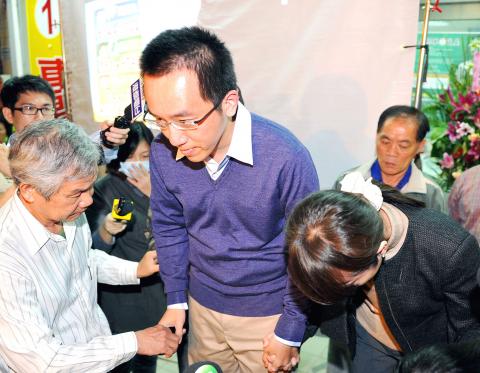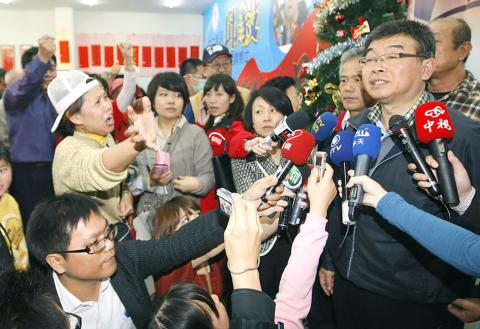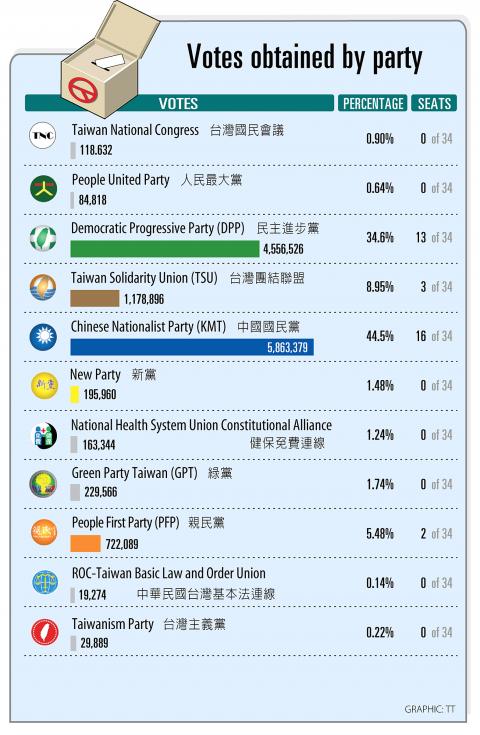The pan-green camp yesterday made substantial gains in the legislature, with the Democratic Progressive Party (DPP) and the Taiwan Solidarity Union (TSU) obtaining more than 43 percent of votes in the legislative election, against a little more than 50 percent for the Chinese Nationalist Party (KMT) and the People First Party (PFP).
The DPP secured more than 4.5 million votes, or 34.6 percent of the vote. The TSU won 1.18 million votes, or 8.95 percent of the vote, while the KMT obtained more than 5.86 million, or 44.55 percent, and the PFP 722,000, or 5.48 percent.
Both the TSU and the PFP made their way back into the legislature by garnering more than 5 percent of the popular vote, a requirement for parties to secure legislator-at-large seats.

Photo: Huang Chih-yuan, Taipei Times
The PFP had a total of 12 candidates competing in the fourth, sixth and eighth districts of Taipei, the first district in New Taipei City (新北市), the seventh and eighth districts in Greater Taichung, the first district in Greater Tainan, in Kinmen County and the third district of Taoyuan County, as well as the mountain area and plains Aboriginal districts.
Some of them were popular legislators, including Lee Ao (李敖) and Liu Wen-hsiung (劉文雄), but almost none were able to gain sufficient votes to come out on top.
The performance of the candidates fielded by the two major parties — the KMT and the DPP — varied.

Photo: CNA
Despite the high publicity that surrounded his campaign, Chen Chih-chung (陳致中), the son of former president Chen Shui-bian (陳水扁), failed in his first bid as an independent candidate. His participation in the ninth district of Greater Kaohsiung is believed to have split the DPP vote and may have cost the DPP’s Kuo Wen-cheng’s (郭玟成) bid for re-election as he lost to KMT Legislator Lin Kuo-cheng (林國正).
Former New Party legislator Joanna Lei (雷倩), the daughter of former Vice Admiral Lei Hsueh-ming (雷學明), who left the KMT in 2007 for the New Party, also failed in her bid as an independent candidate in Zhonghe (中和), New Taipei City.
Former Lienchiang County commissioner Chen Hsueh-sheng (陳雪生), formerly of the PFP, but who ran as an independent, defeated incumbent KMT legislator Tsao Erh-chang (曹爾忠), who was seeking a sixth term in the legislature.

GRAPHIC: TT
Lin Pin-kuen (林炳坤) of the Non-Partisan Solidarity Union and the incumbent legislator for Penghu was defeated by DPP Penghu County councilor Yang Yao (楊曜). Some attributed Lin’s surprising defeat to the fact that the airport in Penghu was closed because of heavy fog, which prevented some people from returning home to vote.
Despite his failure to unseat the KMT’s Alex Fei (費鴻泰), Green Party candidate Pan Han-sheng (潘翰聲) garnered more votes this year, as the DPP and PFP did not field candidates in the seventh district of Taipei.
Former legislator Lo Fu-chu (羅福助), who was running as an independent candidate in the 12th district of New Taipei City and is rumored to have ties to organized crime, trailed the incumbent, KMT Legislator Lee Ching-hua (李慶華) and DPP candidate Shen Fa-hui (沈發惠).
Lo’s son, KMT Legislator Lo Ming-tsai (羅明才), was re-elected in the 11th district of New Taipei City.
Meanwhile, four former Government Information Office ministers also ran in the legislative elections this year, with mixed results.
Su Jun-pin (蘇俊賓), who was running for the KMT in Greater Tainan, failed to unseat DPP Legislator Hsu Tain-tsair (許添財). Johnny Chiang (江啟臣) of the KMT beat his opponent, DPP legislative nominee Kuo Chun-ming (郭俊銘), in Greater Taichung.
DPP candidates Lin Chia-long (林佳龍) and Pasuya Yao (姚文智) both won in Greater Taichung and Taipei respectively. Lin defeated the incumbent, KMT legislator Daniel Hwang (黃義交), while Pasuya Yao defeated Justin Chou (周守訓) of the KMT.
Former government spokesperson Chuang Suo-hang (莊碩漢), meanwhile, failed in his bid to unseat KMT Legislator Lu Chia-chen (盧嘉辰).

A preclearance service to facilitate entry for people traveling to select airports in Japan would be available from Thursday next week to Feb. 25 at Taiwan Taoyuan International Airport, Taoyuan International Airport Corp (TIAC) said on Tuesday. The service was first made available to Taiwanese travelers throughout the winter vacation of 2024 and during the Lunar New Year holiday. In addition to flights to the Japanese cities of Hakodate, Asahikawa, Akita, Sendai, Niigata, Okayama, Takamatsu, Kumamoto and Kagoshima, the service would be available to travelers to Kobe and Oita. The service can be accessed by passengers of 15 flight routes operated by

Chinese spouse and influencer Guan Guan’s (關關) residency permit has been revoked for repeatedly posting pro-China videos that threaten national security, the National Immigration Agency confirmed today. Guan Guan has said many controversial statements in her videos posted to Douyin (抖音), including “the red flag will soon be painted all over Taiwan” and “Taiwan is an inseparable part of China,” and expressing hope for expedited reunification. The agency last year received multiple reports alleging that Guan Guan had advocated for armed reunification. After verifying the reports, the agency last month issued a notice requiring her to appear and explain her actions. Guan

GIVE AND TAKE: Blood demand continues to rise each year, while fewer young donors are available due to the nation’s falling birthrate, a doctor said Blood donors can redeem points earned from donations to obtain limited edition Formosan black bear travel mugs, the Kaohsiung Blood Center said yesterday, as it announced a goal of stocking 20,000 units of blood prior to the Lunar New Year. The last month of the lunar year is National Blood Donation Month, when local centers seek to stockpile blood for use during the Lunar New Year holiday. The blood demand in southern Taiwan — including Tainan and Kaohsiung, as well as Chiayi, Pingtung, Penghu and Taitung counties — is about 2,000 units per day, the center said. The donation campaign aims to boost

The Central Weather Administration (CWA) said a magnitude 4.9 earthquake that struck off the coast of eastern Taiwan yesterday was an independent event and part of a stress-adjustment process. The earthquake occurred at 4:47pm, with its epicenter at sea about 45.4km south of Yilan County Hall at a depth of 5.9km, the CWA said. The quake's intensity, which gauges the actual effects of a temblor, was highest in several townships in Yilan and neighboring Hualien County, where it measured 4 on Taiwan's seven-tier intensity scale, the CWA said. Lin Po-yu (林柏佑), a division chief at the CWA's Seismological Center, told a news conference